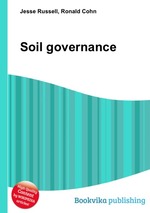Soil governance
Jesse Russell Ronald Cohn
бумажная книга
High Quality Content by WIKIPEDIA articles! Soil Governance Soil Governance entails policies and strategies used, and the processes of decision-making by nation states and local governments on how the soil is utilised. Globally, governance of the soil has been limited to an agricultural perspective due to increased food insecurity from the most populated regions on earth. The Global soil partnership initiated by the Food and Agriculture Organisation FAO and the E.U, hopes to establish links between agricultural productivity, climate change, ecosystem services in national and international soil policies. Governing the soil requires international and national collaboration between governments, local authorities, industries and citizens to ensure implementation of coherent policies that encourage practices and methodologies that regulate usage of the resource to avoid conflict between users. In the European Union environmental policies, soil is recognised as a non-renewable resource, however its governance is maintained at a national level, unlike other non-renewable and climate sensitive resources. In the Developing world, soil governance is biased towards agriculture to promote sustainable agriculture and ensure food security. Governance of the soil differs from Soil management in that, soil management involves practices and techniques used to increase and maintain soil fertility, structure, and carbon sequestration, among others. Soil management techniques are heavily utilised in agriculture, because of the need to regulate the various practices such as tillage techniques, fertiliser application and crop rotation, among others by the various stakeholders involved. The need to monitor and avoid the negative effects of agricultural land use such as soil erosion has formed the basis of the discourse and awareness on soil governance, and has also seen the emergence of science and technology as nexuses between soil management and governance. Soil governance mechanisms are usually encapsulated within the context of land governance, with little focus on urban and industrial soil governance especially in developing countries that have rapid urbanisation rates, thus soil governance is highly interlinked with other atmospheric and anthropogenic processes which may contribute in the difficulty in distinguishing it as an entity.


